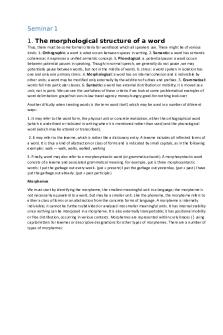AF431 Notes on Seminar 1 discussion questions-1 PDF

| Title | AF431 Notes on Seminar 1 discussion questions-1 |
|---|---|
| Author | Rashika Ram |
| Course | Advance Taxation |
| Institution | The University of the South Pacific |
| Pages | 2 |
| File Size | 68.6 KB |
| File Type | |
| Total Downloads | 85 |
| Total Views | 137 |
Summary
check...
Description
AF431 Notes on Seminar 1 Discussion Questions: 1. Is there anything wrong with wanting more accurate (product) cost information? Accounting information is socially constructed – there is no absolute truth, so what does “accurate” mean? There’s no harm in wanting, but wants can’t always be met. 2. What’s wrong with requiring more efficiency/ productivity from employees? Firstly, what is meant by “efficiency/productivity”? Usually it is a partial measure, and improving labour productivity, for example, may not bring better results overall. Think about sequential operations, with a bottleneck in the middle – improving the efficiency of operatives before the bottleneck only adds to (inventory) problems. Secondly, there is a distinction between efficiency and effectiveness. More efficiency, if it is not also effective, is no use. 3. What’s wrong with using cost-benefit analysis as the basis for choice? As a general framework, CBA is appealing. However, it assumes that all the costs and benefits can be quantified in monetary terms. This can be difficult or impossible to do (e.g. the cost of a life) and comparisons become an issue of assumptions. It is also the case that costs may be more easily identified and measured than benefits, which can bias decisions in favour of least-cost alternatives. 4. What’s wrong with using economic analysis in general as the basis for choice? This is linked to question 3. Opportunity costs, in particular, are often difficult to identify and measure. More fundamentally, Economic choice is based on utilitarianism, i.e. taking the alternative with the highest expected net outcome value. But this implies evaluation on the basis of ends, rather than means, possibly resulting in “the ends justifying the means” in ethical terms. 5. What’s wrong in assuming rationality in how information will be used? Economic rationality usually assumes comprehensive knowledge of all alternatives, and the ability to evaluate them. Bounded rationality recognizes that people are limited in their decision making capacities, and may “satisfice” rather than optimize. More generally, decision makers faced with novel situations may not know their objectives, or how to apply them, so may engage in non-rational (not irrational) choice behaviour.
1
6. Economic Darwinism: those practices which continue in use by organizations must be best, otherwise it would not survive. What’s wrong with that? It contradicts a basic philosophical tenet – that you cannot reason from what “is” to what “should be”. In this case, competitive survival does not necessarily imply that current practices are “best”, because through market failures (e.g. imperfect competition), they could have persisted “by accident”. Incidentally, Darwin’s Theory doesn’t actually predict evolution through “the survival of the fittest”, but rather shows the long run effects of random mutations, and can take a very long time in sorting “good” from less good adaptations (much longer than the average life of businesses!). 7. What’s wrong with asking decision makers to take qualitative issues into consideration, as well as the results of quantitative analysis? It all depends on the weights given to the various types of information. Unfortunately, in modern society, more credence is often given to numbers (and financial numbers at that) than words. Presenting the numerical analysis first, then asking for it (possibly) to be modified through considering qualitative factors puts the latter in the role of an afterthought and, potentially, biases decisions.
2...
Similar Free PDFs

Camus LHote - seminar discussion
- 3 Pages

Seminar-Discussion-Questions Answers
- 29 Pages

Macbeth seminar notes 1
- 1 Pages

Seminar 1 - notes
- 5 Pages

Seminar on word-formation
- 12 Pages

Seminar on skinput
- 17 Pages

Seminar Report on Robotics
- 42 Pages

Feedback on Seminar 4
- 5 Pages

Seminar 1
- 15 Pages

SEMINAR REPORT ON RASPBERRY PI
- 27 Pages

seminar report on li fi
- 17 Pages

A SEMINAR REPORT On WITRICITY
- 20 Pages

Seminar on Loss of Control
- 3 Pages
Popular Institutions
- Tinajero National High School - Annex
- Politeknik Caltex Riau
- Yokohama City University
- SGT University
- University of Al-Qadisiyah
- Divine Word College of Vigan
- Techniek College Rotterdam
- Universidade de Santiago
- Universiti Teknologi MARA Cawangan Johor Kampus Pasir Gudang
- Poltekkes Kemenkes Yogyakarta
- Baguio City National High School
- Colegio san marcos
- preparatoria uno
- Centro de Bachillerato Tecnológico Industrial y de Servicios No. 107
- Dalian Maritime University
- Quang Trung Secondary School
- Colegio Tecnológico en Informática
- Corporación Regional de Educación Superior
- Grupo CEDVA
- Dar Al Uloom University
- Centro de Estudios Preuniversitarios de la Universidad Nacional de Ingeniería
- 上智大学
- Aakash International School, Nuna Majara
- San Felipe Neri Catholic School
- Kang Chiao International School - New Taipei City
- Misamis Occidental National High School
- Institución Educativa Escuela Normal Juan Ladrilleros
- Kolehiyo ng Pantukan
- Batanes State College
- Instituto Continental
- Sekolah Menengah Kejuruan Kesehatan Kaltara (Tarakan)
- Colegio de La Inmaculada Concepcion - Cebu


